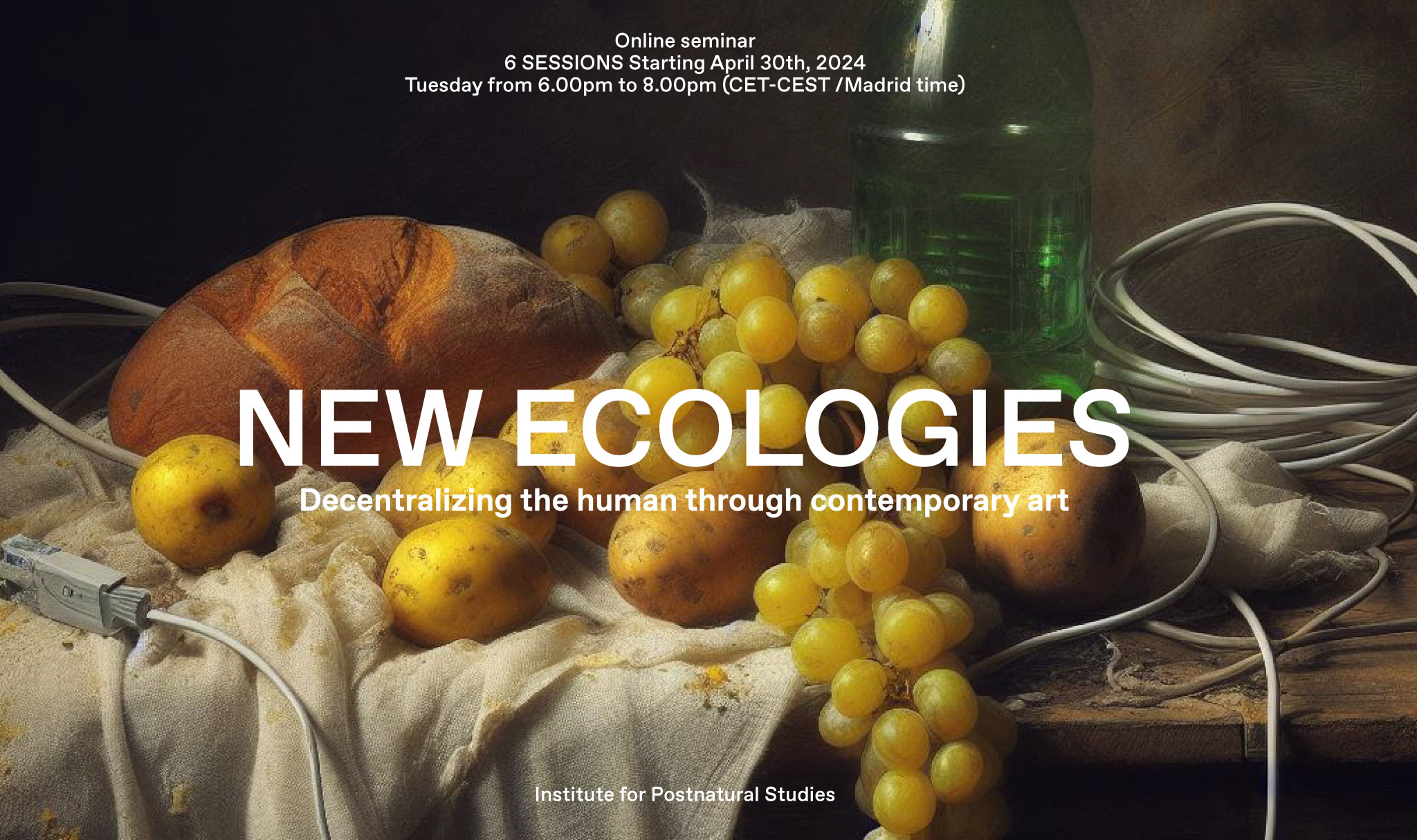Postnatural Independent Program 2024

LAST DAY TO APPLY!
Send your submissions before 23:59 (GMT-8)
The second edition of the Postnatural Independent Program (PIP) will explore the new implications of postnature as a framework for contemporary creation. In the form of an experimental educational platform, we will speculate and question not only contemporary ecologies but also new academic approaches and radical notions of learning together.
The Independent Program offered by the Institute for Postnatural Studies (IPS) is a new learning space that offers theoretical tools, embodied learning, and expertise to define and develop projects that examine postnature as a framework for contemporary creation. Its duration is six months (January - June 2024), using a dual methodology incorporating both theory and practice. Based on IPS’ ongoing initiatives, it offers an experimental platform for ecological thinking and cultural initiatives in an expanded virtual campus, approaching the students’ potential from a holistic mentoring perspective. It also brings together established researchers and art institutions that will host working sessions, encounters, and presentations. The program is structured in 3 online modules, accompanied by renowned international thinkers, artists, curators, and philosophers, complemented by two in-person laboratories in Madrid in which students will share their investigation in a community-building environment.
Please visit www.ips-independentprogram.org to know more about the full 2024 program.
For whom
The Postnatural Independent Program (PIP) is addressed to a diversity of profiles in terms of education, experience background, and aspirations: students from both art and theoretical practices, artists, curators, theorists, designers, scientists, researchers, educators, or anyone interested in exploring contemporary ecological debates. It is oriented to those with a preconceived context/knowledge of these themes and a project that could benefit from tutoring and guidance toward its better definition and practical steps for its possible materialization.
Topics and structure
The idea of a romanticized nature as a background scenario or neutral framework where human activity simply takes place is no longer valid and must be replaced by a broader and more complex reflection. From a critical perspective, we must deepen into the various layers, hybrid codes, and entanglements that compose it. The environment can no longer be read only as a resource to be managed, nor as a set of given circumstances to which we must adapt, but as one of the main cultural-material constructions of modernity. This program will revolve around the concept of postnature, understood as a political arena and subject in conflict. It will function as a debate platform from which to investigate, problematize, discuss and multiply new approaches to artistic and thought practices through political ecologies, post-Darwinist aesthetics, and the creation of more-than-human ethics that contribute to the definitive dissolution of the nature-culture binomial in all its sequels, variants and consequences.
The program will also navigate concepts such as the Anthropocene or the Chtulhucene in its multiple meanings and implications, ecological parliaments and perspectivism, colonialism and the necropolitics associated with human and non-human “resources”, new materialisms, ecofeminisms, and queer theories. Through practical experience and critical sessions, the goal will be to articulate a change of perspective allowing for the proliferation of voices and points of view regarding the problem of nature in the contemporary moment.
Methodology
The PIP will explore different learning formats from an interdisciplinary perspective. Most sessions will be held online through conversations, lectures, and experimental embodied exercises driven by the IPS faculty and guest speakers. Each session has reading materials that will be listed and shared beforehand. To favor a community-based experience, we will share moments in common in the form of tutorial laboratories where we will connect with each other and respective practices through individual and collective dialogues, experimental performative methodologies, and theoretical knowledge in a safe environment. We believe in a horizontal approach to learning in which we value not only the information shared but also the bonds and possible futures and kinships that can be germinated during our time together.
Encounters: In-person gatherings in Madrid
During our time together we have programmed two presential encounters in Madrid aimed at weaving connections between local initiatives and international agents. These are not mandatory but highly recommended. The first will take place mid-course, from April 22nd to April 26th. In this first gathering, we will do field trips, visiting cultural institutions, postnatural places around Madrid to elaborate on and embody the course research through personal relationships and interactions. During this time, there will also be in-person tutorships and workshops in a renowned cultural institution in Madrid. The program will end with a second encounter that will take place from June 10th to June 16th. With the guidance of a curatorial professional (to be announced), we will finalize and produce the presentation of projects developed during our time together. This event will be presented at a notable cultural institution in the city of Madrid. The participants will assume the transportation and housing costs to meet during these encounters but our team will gladly help in the organization and arrangement of these matters.
Research-based practices
This program is aimed at the development of research and artistic projects that find themselves at a beginning stage or at a crossroads and would benefit from sharing it in the collective, interdisciplinary context of the PIP. To that end, specific moments will be set aside throughout the semester for students to present their research and discuss it collectively with the rest of the group (LAB 1 & 2) and with members of the faculty (continued tutorships). The research can be presented in a variety of formats: academic, performative, filmic, curatorial, plastic, installative, among others. The final presentation will take place in July 2023.
Please visit www.ips-independentprogram.org to know more about the full 2024 program and submission details.